Papers by Lamia Moghnieh
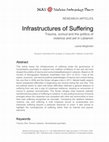
Medicine Anthropology Theory, 2021
This article traces the infrastructures of suffering under the governance of humanitarian psychia... more This article traces the infrastructures of suffering under the governance of humanitarian psychiatry to explore how material conditions of war and aid have shaped the politics of trauma and sumud [steadfastness] in Lebanon. Based on 29 months of ethnographic fieldwork undertaken from 2011 to 2013, I look at the expert, economic, and techno-political assemblages of trauma and sumud during the July War in 2006 and the Syrian refugee crisis in 2011. Mental health experts faced unexpected difficulties in diagnosing war trauma during the July War. This led political actors to claim that these difficulties reflected a general absence of suffering from war and a sign of Lebanese resilience, drawing on economies of sumud in postwar reconstruction. The Syrian refugee crisis however radically transformed the politics of suffering in Lebanon. A new political economy of trauma emerged where the Lebanese now competed with other aid communities to have their past suffering recognised as traumatic. Comparing the relations between violence, aid, and suffering in both instances serves to contextualise and historicise suffering beyond a particular discourse or event. It also serves to highlight the contingencies of suffering rather than its internal and psychic elements.
To cite this article: Lamia Moghnieh (2017) 'The violence we live in': reading and experiencing v... more To cite this article: Lamia Moghnieh (2017) 'The violence we live in': reading and experiencing violence in the field, Contemporary Levant, 2:1, 24-36,
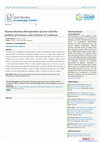
This paper relies on ethnographic and archival research to narrate the humanitarian trouble in f... more This paper relies on ethnographic and archival research to narrate the humanitarian trouble in finding trauma in the July 2006 war in Lebanon. The humanitarian inability to easily locate a visible trauma shared by war-affected communities intersected with other political, social and public health debates on the modern ways of suffering from war and violence in 2006 Lebanon. This paper provides a preliminary reading of these debates, as I argue that trauma, whether defined and framed by psychiatry, psychology and humanitarianism as Post-traumatic Stress Disorder (PTSD), or evoked in popular Lebanese culture and discourse to express suffering, takes many material, political and ideological values for different stakeholders and communities in Lebanon. This multi-faceted meaning of trauma in Lebanon, sometimes intersecting, other times clashing, provides us with an understanding of the contemporary politics of suffering from violence in Lebanon.
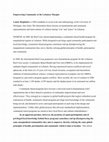
Lamia Moghnieh is a PhD candidate in social work and anthropology at the University of Michigan, ... more Lamia Moghnieh is a PhD candidate in social work and anthropology at the University of Michigan, Ann Arbor. Her dissertation thesis focuses on humanitarian and communal representations and interventions of violence during "war" and "peace" in Lebanon. INGRESS: In 2009, the Red Cross started implementing a community-based health program for marginalized regions in Lebanon. While designed to privilege equal community participation and local knowledge, community-based programs sometimes end up disempowering the marginalized communities they serve, thereby reifying global principles of health, participation and community. In 2009, the International Red Cross proposed a new humanitarian program for the Lebanese Red Cross society: Community-Based Health and First Aid (CBHFA), to be implemented for underprivileged communities in Lebanon. Having experienced massive political and social upheavals, in the form of a 15-year civil war, Israeli invasion, occupation and intermittent outbursts of internal political violence, Lebanon represented an exemplary site for CBHFA, designed as a preventive program against conflicts. More recently, the war in Lebanon in 2006 resulted in at least 1,109 deaths, 4,399 injuries and the displacement of an estimated one million individuals. 1 Community-based programs have become a universal trend in humanitarian relief organizations due to their attractive premises of community empowerment and costeffectiveness. 2 They emerged as a response to global health projects that neglect embodied social experiences of health; community-based programs privilege local knowledge of the community being served, and demand its active and equal participation at each step in the design and implementation. 3 Unlike other global projects that advocate standardized implementation, community-based programs are meant to have local flavor and cultural embeddedness. 4

Social Indicators Research
The present study evaluated the subjective happiness of Lebanese college youth using a multi-item... more The present study evaluated the subjective happiness of Lebanese college youth using a multi-item rather than a single-item subjective happiness measure. An Arabic translation of the Subjective Happiness Scale (SHS) was administered to 273 Lebanese college youth from state- and private-run higher institutions of learning, as was the Arabic Adult Parental Acceptance-Rejection Questionnaire (Arabic PARQ). The reliability and validity of the Arabic SHS was tested in terms of factor analysis, internal consistency, and correlation with Arabic PARQ scores, as was the factorial invariance and relation of the scale across age, sex, marital status, birth order, and college campus. The Arabic SHS showed a reliable unitary structure similar to those found in other cultures, and factorial invariance across sex, marital status, birth order and college campus. While age, sex, marital status and birth order were independent of happiness scores, college students attending the private university reported greater happiness than those from the state-run academic setting. It was concluded that the Lebanese Arabic SHS is a reliable and valid measure of global subjective happiness, its factor structure is similar across other translated versions of the scale, and its scores are independent of age, sex, marital status and birth order.
This research examined maternal and paternal w armth (acceptance) and rejection (hostility and ag... more This research examined maternal and paternal w armth (acceptance) and rejection (hostility and aggression, indifference/neglect, and undifferentiated rejection), as remembered by young adults, in relation to humor styles and subjective happiness.
Book Reviews by Lamia Moghnieh
Sami Hermez, War Is Coming: Between Past and Future Violence in Lebanon. Philadelphia: University... more Sami Hermez, War Is Coming: Between Past and Future Violence in Lebanon. Philadelphia: University of Pennsylvania Press, 2017. 280 pp.
Workshop by Lamia Moghnieh

Out of the Archives. New Archival Practices: Towards Alternative Historiographies, Voices, and Spaces
Forum Transregionale Studien, 2018
Exploring archives, connecting fragmented histories.
The rationale for this workshop stems fro... more Exploring archives, connecting fragmented histories.
The rationale for this workshop stems from the conveners’ awareness, as practitioners working on archives in different disciplines, capacities and contexts, of pressing questions concerning these sources and their use. The first of these questions is related to the very nature of the archive: what is archived, why, how, and by whom? The second is related to the legitimacy of those who consume archival material and produce knowledge based on that experience: who grants access, to whom, and why? In other words, who “owns” the archive? The third broad set of questions concerns consumers or recipients: for whom is knowledge produced? Who is the audience? Are they citizens to be educated, targets of ideology, recipients of assumptions regarding what is worthy of preservation, and why?
Based on these concerns, participants will tackle questions relating to access, methodology, and dissemination. We envision a three-day event, part of which will be a practicum, engaging scholars in projects devoted to making their archival materials accessible to wider publics. The panels will be devoted to creating a space for sharing experiences of and in archives; renewing our knowledge of archives in Beirut, Berlin, Cairo, Damascus, Istanbul, and elsewhere - outside the capital cities of the countries that we live and research in; and comparing agendas and approaches.
The workshop will engage participants based in Germany in a broad discussion to explore the potential for creativity in the archive, making connections and contributing to a collective experience and practice of the archive. It will invite practitioners to blur the boundaries between traditional sites of historical knowledge production: the academy, the arts, and civil society. Participants will explore ways in which current techniques of archive conservation tend to erase rather than reveal, and exclude rather than include. We will call for alternative historiographic practices that take into account the experiences of the archives ― for the researcher, but also for the people and stories we find in the archives.
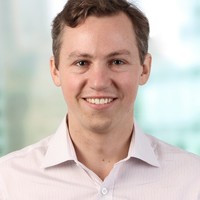








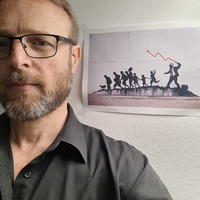
Uploads
Papers by Lamia Moghnieh
Book Reviews by Lamia Moghnieh
Workshop by Lamia Moghnieh
The rationale for this workshop stems from the conveners’ awareness, as practitioners working on archives in different disciplines, capacities and contexts, of pressing questions concerning these sources and their use. The first of these questions is related to the very nature of the archive: what is archived, why, how, and by whom? The second is related to the legitimacy of those who consume archival material and produce knowledge based on that experience: who grants access, to whom, and why? In other words, who “owns” the archive? The third broad set of questions concerns consumers or recipients: for whom is knowledge produced? Who is the audience? Are they citizens to be educated, targets of ideology, recipients of assumptions regarding what is worthy of preservation, and why?
Based on these concerns, participants will tackle questions relating to access, methodology, and dissemination. We envision a three-day event, part of which will be a practicum, engaging scholars in projects devoted to making their archival materials accessible to wider publics. The panels will be devoted to creating a space for sharing experiences of and in archives; renewing our knowledge of archives in Beirut, Berlin, Cairo, Damascus, Istanbul, and elsewhere - outside the capital cities of the countries that we live and research in; and comparing agendas and approaches.
The workshop will engage participants based in Germany in a broad discussion to explore the potential for creativity in the archive, making connections and contributing to a collective experience and practice of the archive. It will invite practitioners to blur the boundaries between traditional sites of historical knowledge production: the academy, the arts, and civil society. Participants will explore ways in which current techniques of archive conservation tend to erase rather than reveal, and exclude rather than include. We will call for alternative historiographic practices that take into account the experiences of the archives ― for the researcher, but also for the people and stories we find in the archives.
The rationale for this workshop stems from the conveners’ awareness, as practitioners working on archives in different disciplines, capacities and contexts, of pressing questions concerning these sources and their use. The first of these questions is related to the very nature of the archive: what is archived, why, how, and by whom? The second is related to the legitimacy of those who consume archival material and produce knowledge based on that experience: who grants access, to whom, and why? In other words, who “owns” the archive? The third broad set of questions concerns consumers or recipients: for whom is knowledge produced? Who is the audience? Are they citizens to be educated, targets of ideology, recipients of assumptions regarding what is worthy of preservation, and why?
Based on these concerns, participants will tackle questions relating to access, methodology, and dissemination. We envision a three-day event, part of which will be a practicum, engaging scholars in projects devoted to making their archival materials accessible to wider publics. The panels will be devoted to creating a space for sharing experiences of and in archives; renewing our knowledge of archives in Beirut, Berlin, Cairo, Damascus, Istanbul, and elsewhere - outside the capital cities of the countries that we live and research in; and comparing agendas and approaches.
The workshop will engage participants based in Germany in a broad discussion to explore the potential for creativity in the archive, making connections and contributing to a collective experience and practice of the archive. It will invite practitioners to blur the boundaries between traditional sites of historical knowledge production: the academy, the arts, and civil society. Participants will explore ways in which current techniques of archive conservation tend to erase rather than reveal, and exclude rather than include. We will call for alternative historiographic practices that take into account the experiences of the archives ― for the researcher, but also for the people and stories we find in the archives.